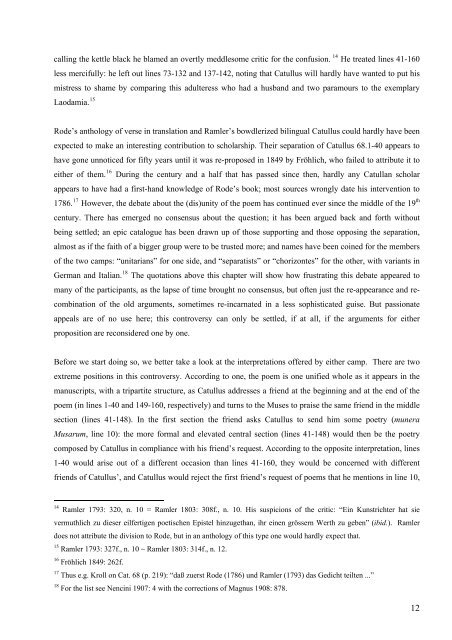CATULLUS 68 - Scuola Normale Superiore
CATULLUS 68 - Scuola Normale Superiore
CATULLUS 68 - Scuola Normale Superiore
You also want an ePaper? Increase the reach of your titles
YUMPU automatically turns print PDFs into web optimized ePapers that Google loves.
calling the kettle black he blamed an overtly meddlesome critic for the confusion. 14 He treated lines 41-160<br />
less mercifully: he left out lines 73-132 and 137-142, noting that Catullus will hardly have wanted to put his<br />
mistress to shame by comparing this adulteress who had a husband and two paramours to the exemplary<br />
Laodamia. 15<br />
Rode’s anthology of verse in translation and Ramler’s bowdlerized bilingual Catullus could hardly have been<br />
expected to make an interesting contribution to scholarship. Their separation of Catullus <strong>68</strong>.1-40 appears to<br />
have gone unnoticed for fifty years until it was re-proposed in 1849 by Fröhlich, who failed to attribute it to<br />
either of them. 16 During the century and a half that has passed since then, hardly any Catullan scholar<br />
appears to have had a first-hand knowledge of Rode’s book; most sources wrongly date his intervention to<br />
1786. 17 However, the debate about the (dis)unity of the poem has continued ever since the middle of the 19 th<br />
century. There has emerged no consensus about the question; it has been argued back and forth without<br />
being settled; an epic catalogue has been drawn up of those supporting and those opposing the separation,<br />
almost as if the faith of a bigger group were to be trusted more; and names have been coined for the members<br />
of the two camps: “unitarians” for one side, and “separatists” or “chorizontes” for the other, with variants in<br />
German and Italian. 18 The quotations above this chapter will show how frustrating this debate appeared to<br />
many of the participants, as the lapse of time brought no consensus, but often just the re-appearance and recombination<br />
of the old arguments, sometimes re-incarnated in a less sophisticated guise. But passionate<br />
appeals are of no use here; this controversy can only be settled, if at all, if the arguments for either<br />
proposition are reconsidered one by one.<br />
Before we start doing so, we better take a look at the interpretations offered by either camp. There are two<br />
extreme positions in this controversy. According to one, the poem is one unified whole as it appears in the<br />
manuscripts, with a tripartite structure, as Catullus addresses a friend at the beginning and at the end of the<br />
poem (in lines 1-40 and 149-160, respectively) and turns to the Muses to praise the same friend in the middle<br />
section (lines 41-148). In the first section the friend asks Catullus to send him some poetry (munera<br />
Musarum, line 10): the more formal and elevated central section (lines 41-148) would then be the poetry<br />
composed by Catullus in compliance with his friend’s request. According to the opposite interpretation, lines<br />
1-40 would arise out of a different occasion than lines 41-160, they would be concerned with different<br />
friends of Catullus’, and Catullus would reject the first friend’s request of poems that he mentions in line 10,<br />
14<br />
Ramler 1793: 320, n. 10 = Ramler 1803: 308f., n. 10. His suspicions of the critic: “Ein Kunstrichter hat sie<br />
vermuthlich zu dieser eilfertigen poetischen Epistel hinzugethan, ihr einen grössern Werth zu geben” (ibid.). Ramler<br />
does not attribute the division to Rode, but in an anthology of this type one would hardly expect that.<br />
15<br />
Ramler 1793: 327f., n. 10 ~ Ramler 1803: 314f., n. 12.<br />
16<br />
Fröhlich 1849: 262f.<br />
17<br />
Thus e.g. Kroll on Cat. <strong>68</strong> (p. 219): “daß zuerst Rode (1786) und Ramler (1793) das Gedicht teilten ...”<br />
18 For the list see Nencini 1907: 4 with the corrections of Magnus 1908: 878.<br />
12






